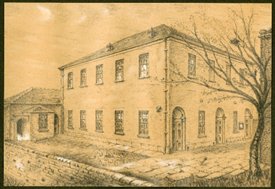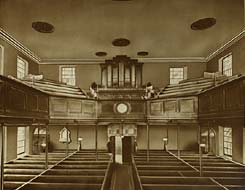High Pavement Chapel, Nottingham
The roots of High Pavement Chapel lay in the ejection of Presbyterian ministers from their livings in 1662-1663. John Whitlock and William Reynolds, formerly of St Mary's, and John Barrett, formerly of St Peter's, Nottingham, set up a Presbyterian classis during the Commonwealth period in the 1650s. A classis is a grouping of elders or pastors from various churches or congregations in an area.
After their expulsion from the established Anglican church in 1662, the ministers attended conventicles (religious meetings) in Mansfield, before returning to Nottingham in 1690 or 1691. The passing of the Toleration Act in 1689 allowed for the registration of dissenting chapels, of which High Pavement Independent Chapel was one early example in Nottingham, along with Castle Gate.
In the early to mid-18th century the congregation became Unitarian. The chapel was rebuilt in 1805, and again in 1876. The 1876 building, in ornate Gothic style, is still standing.


Exterior and interior of the old High Pavement chapel, standing 1805-1874 (Hi 3 P 138 and Hi P 13/8)
High Pavement Chapel made a notable contribution to Nottingham education by founding one of the first non-sectarian charity schools in the country in 1788. The Chapel also set up a successful mutual insurance association in 1807, the Provident Friendly Society, which only came to an end with the advent of National Insurance in 1948.
In 1982 the congregation moved from High Pavement to a converted warehouse in Plumptre Street in the Lace Market, where in 2024 they still worship. The Congregational Committee there can advise on research into the chapel's history, and the scope of relevant research material at the Unitarian clerical colleges (in Oxford and Manchester), Essex Hall and Dr. Williams's Library.
The old High Pavement church was converted into a lace museum in the early 1980s, and then a public house.
Records
The records of High Pavement Chapel are described in three separate catalogues (Hi, Hi 2 and Hi 3), reflecting three separate deposits of material at The University of Nottingham.
The earliest document is the Minute Book of the first Presbyterian classis in Nottingham, 1654-1660 (Hi 2 M 1). This volume also contains a birth and death register for members of the chapel, 1691-c.1720.
The collection contains administrative papers such as accounts, title deeds and a complete set of chapel minutes, 1777-1954 (Hi M). There are plans of the new building erected in 1876, and extensive series of portraits, prints and photographs.
There are papers relating to the High Pavement Chapel Provident Friendly Society, 1828-1949 (Hi F, Hi 2 F and Hi 3 F), and the High Pavement Chapel Mutual Improvement Society, 1819-1873 (Hi I).
The history of the High Pavement Day Schools are recorded in registers and papers dated 1805-1935 (Hi S and Hi 3 S). There are also papers relating to the Sunday School, 1815-1969 (Hi Su, Hi 2 Su and Hi 3 Su).
The remnants of the Chapel's library can also be found in the collection. This includes a number of significant seventeenth and eighteenth century imprints. The personal papers of John Crosby Warren (d 1931), a prominent member of the congregation and Warden of the Chapel, also feature. They include correspondence, draft articles and lectures, and material collected by him relating to the history of the Chapel (Hi W).
A set of chapel magazines is available for reference in the printed collections held by Manuscripts and Special Collections (East Midlands Collection Periodicals:Not). The magazines have various titles: 'The High Pavement Chapel chronicle : a congregational journal' (1872-1961); 'Chronicle' (1961-1978); 'Newsletter' (1983-1985); 'Unitarian' (1986-1987), and 'Nottingham Derby Unitarians: Newsletter' (1987-2004).
A few related records are held at Nottinghamshire Archives:
Registers
A few early registers are held in the High Pavement Collection at The University of Nottingham:
- Copies of birth and death register, 1691-c.1720 (Hi 2 M 1)
- Transcript of baptism register, 1691-1724 (Hi R 1)
- Transcript of baptism register, 1723-1837 (Hi R 2)
Pre-1837 registers from High Pavement Chapel are held at The National Archives:
- Birth and baptism register, 1690-1723 (RG 4/1587)
- Birth and baptism register, 1723-1777 (RG 4/1588)
- Birth and baptism register, 1760-1827 (RG 4/137)
- Birth and baptism register, 1811-1837 (RG 4/2674)
Microfiche copies of these registers can be seen at The National Archives and at Nottinghamshire Archives.
The website www.bmdregisters.co.uk offers paid access to digital images of the registers via a subscription. It is free to search the registers on this website.
Indexes to the registers are also available as part of the International Genealogical Index (IGI) and can be searched for free on www.familysearch.org.
Further Reading
The story of High Pavement Chapel, Nottingham. (Ramsgate : Church Publishers, [1964]) [King’s Meadow Campus East Midlands Collection Pamphlet Not 3.M74 HIG]
The High Pavement Chapel Sunday School : triple jubilee of the foundation. ([Nottingham : s.n.], 1955) [King’s Meadow Campus East Midlands Collection Pamphlet Not 3.M74 HIG]
Weeks, Alice. Some notes on the memorials and other objects of interest and beauty in the High Pavement Chapel, Nottingham. ([Nottingham : High Pavement Chapel, 1936]) [King’s Meadow Campus East Midlands Collection Not 3.M74 HIG]
Warren, John Crosby. A biographical catalogue of portraits and a list of books, documents and relics relating to our congregational history in the custody of the Chapel Trustees (Nottingham : High Pavement Chapel, [1934]) [King’s Meadow Campus East Midlands Collection Not 3.M74 HIG]
High Pavement School
Bates, Alan. High Pavement remembered, 1788-1988 ([Nottingham : Nottinghamshire County Council, Education), 1988) [King’s Meadow Campus East Midlands Collection Not 3.J26 HPS]
Next page: Christ Church, Peas Hill, Nottingham